
On October 28, Cambodia hosted the third Vietnam - Laos - Cambodia Buddhist Summit under the theme “Harmonizing Buddhism for Peace and Sustainable Development”. The summit was organized by the Ministry of Cults and Religion in cooperation with the leading Buddhist councils of Cambodia’s two Buddhist orders.
The summit provides a key platform for spiritual leaders of Cambodia, Laos, and Vietnam to strengthen traditional friendship and solidarity while showcasing Buddhism’s contribution to the construction and development of each country, particularly in economic, social, educational, and cultural sectors, as well as in human capital development along Buddhist principles.
The delegation of the Ministry of Ethnic and Religious Affairs of Vietnam led by Deputy Minister Nguyễn Hải Trung attended the summit.
The opening session of the 3rd Buddhist Summit took place solemnly on the morning at the Cambodiana Hotel in Phnom Penh, with the participation of nearly 240 delegates representing Buddhist leaders and religious management agencies of the three countries.
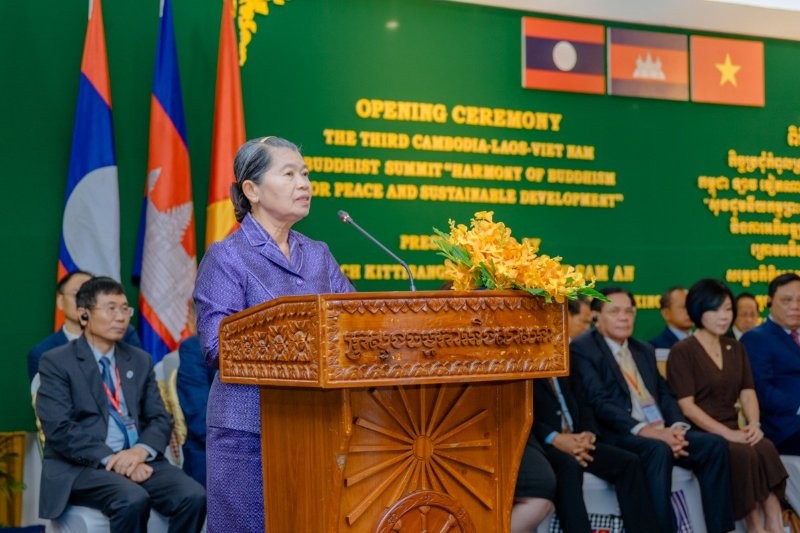
The opening ceremony was presided over by Men Sam An, a Member of the Supreme Privy Council of the King
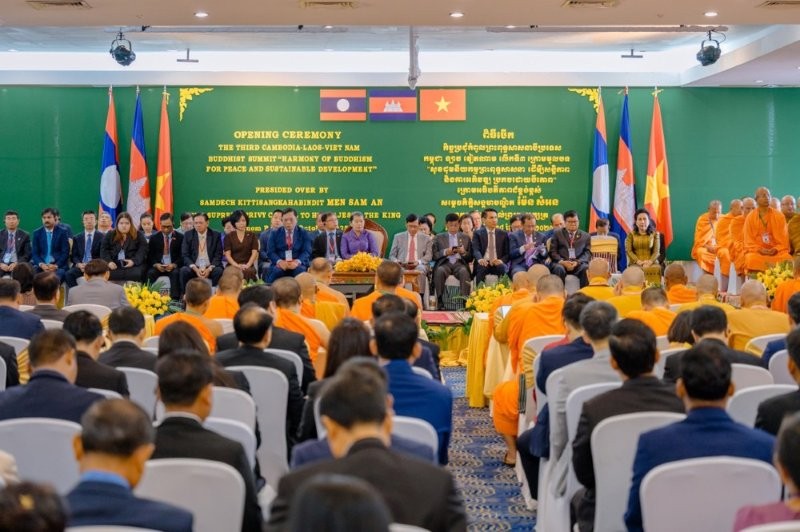
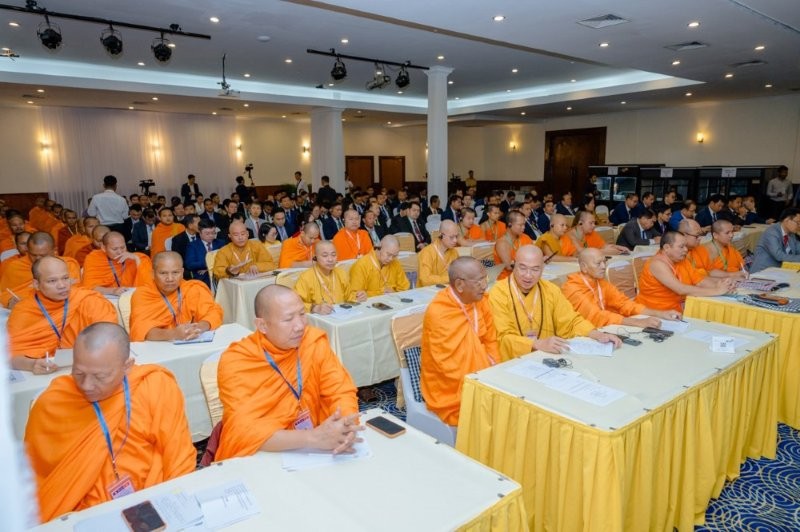
The event was attended by Deputy Minister of Ethnic and Religious Affairs of Vietnam Nguyễn Hải Trung; Deputy Minister and Deputy Director of the Office of the Prime Minister of Laos Kheungkham Keonuchan; Most Venerable Am Lim Heng, Supreme Patriarch of the Maha Nikaya order; Most Venerable Bour Kry, Great Supreme Patriarch of the Dhammayuttika Nikaya; Most Venerable Thích Huệ Thông, Vice-President of the Central Executive Council of the Vietnam Buddhist Sangha; Most Venerable Thavone Taphonepaseuth, Assistant to the Acting President of the Central Buddhist Association of Laos, and other senior monks and officials
Speaking at the event, Mrs. Men Sam An said that, the summit provides a key platform for spiritual leaders of Cambodia, Laos, and Vietnam to strengthen traditional friendship and solidarity while showcasing Buddhism’s contribution to the construction and development of each country, particularly in economic, social, educational, and cultural sectors, as well as in human capital development along Buddhist principles.
At the event, Deputy Minister of Ethnic and Religious Affairs Nguyễn Hải Trung delivered a speech with the theme “Connection from the UN Day of Vesak 2025 to the Buddhist Summit of the three Indochinese countries: For a world of peace and sustainable development”.
The Deputy Minister emphasized that Vietnam, Cambodia and Laos have a long-standing relationship of friendship, solidarity and cooperation, in which Buddhism is a spiritual bond, contributing to cultivating peace and compassion among the people of the three countries.
He affirmed that the Buddhist Summit is an important forum which not only contributing to strengthening the exchange and close relationship between Buddhism of the three countries, but also aiming at a noble and consistent goal of building a world of peace, happiness and sustainable development.
The theme of the 2025 “Harmonising Buddhism for Peace and Sustainable Development” reflects the succession of the spirit of the two summits in 2018 and 2023 in Laos and Vietnam, as well as, features the strong commitment of the Cambodian Government and Buddhism in promptly implementing the spirit of the Joint Statement of the UN Day of Vesak 2025 held last May in Ho Chi Minh City, Vietnam.
The Vietnamese State always respects and ensures freedom of belief and religion, and considers Buddhist cooperation as an important people-to-people diplomacy channel which contributing to strengthening friendship, harmony and sustainable development in the region, the Vietnamese Deputy Minister affirmed.

Deputy Minister Nguyễn Hải Trung speaks at the event
During the discussion session, Vice Chairwoman of the Government Committee for Religious Affairs of Vietnam Trần Thị Minh Nga shared her experiences on religious affairs in Vietnam.
The speech with keywords of harmony, peace, and sustainable development emphasized the viewpoint on solidarity and religious harmony clearly stated by the Central Committee of the Communist Party of Vietnam in the Party's Resolutions, as well as institutionalized in the Constitutions and legal system of Vietnam.
Vice Chairwoman Trần Thị Minh Nga stated that Vietnam is a country with a very rich and diverse religious life. However, there are no religious conflicts or contradictions in the country. Instead, religions in Vietnam maintain respectful and cooperative relationships with each other and with the social community.
By December 2024, 95% of the country’s population adhered to beliefs and religions. There were 43 organizations belonging to 16 religions that were granted certificates of organization or religious activities, with nearly 28 million followers accounting for nearly 28% of the country's population. Buddhism is the religion with the largest number of dignitaries and lay followers in the country.
The Central Committee of the Communist Party of Vietnam has issued many resolutions expressing its viewpoints on solidarity and harmony related to religion: - Beliefs and religions are considered to be spiritual needs of a portion of the population. Religious individuals are part of the great national unity bloc.
- The Party and State of Vietnam consistently implement the policy of great national unity, unity among compatriots of different religions, unity among compatriots of religions and non-religious compatriots. Discrimination against citizens based on belief or religion is strictly prohibited. At the same time, exploiting belief or religion to commit illegal activities, incite division, cause disorder, and violate national security is strictly prohibited.
- The Vietnamese State affirms its consistent implementation of the policy of respecting and ensuring the right to freedom of belief, the right to follow or not to follow any religion, and the right to engage in normal religious activities in accordance with the law. Religions operate within the framework of the law and are equal before the law.
- The Communist Party of Vietnam embraces the goal of a prosperous people, a strong nation, and a just, democratic, and civilized society as a shared foundation to unite and connect religious compatriots with the common cause of the country.
The policies of the Communist Party of Vietnam have been institutionalized in the Constitution and legal system of Vietnam.
The 1946 Constitution of the Democratic Republic of Vietnam affirmed the principle of "National unity regardless of race, gender, class, or religion." The 2013 Constitution further stipulates that all ethnic groups are equal, united, respectful, and help each other to develop, and strictly prohibits all acts of ethnic discrimination and division.
The document with the highest legal value regulating current religious and belief activities in Vietnam is the Law on Belief and Religion, which the Vietnamese State specifically stipulates:
- Bringing together people with and without beliefs or religions to foster a strong national unity bloc, build, and protect the Fatherland;
- Strictly prohibiting discrimination and prejudice based on beliefs or religions, as well as the misuse of religious activities to divide the nation and religions; separating people with beliefs or religions from those without; dividing individuals with differing beliefs or religions; and infringing upon national defense, security, sovereignty, social order and safety, and the environment.
The Vice Chairwoman of the Government Committee for Religious Affairs of Vietnam stated that Buddhism is known as a peace-loving religion, promoting the resolution of conflicts in the spirit of harmony and reconciliation. The Vietnam Buddhist Sangha has flexibly and creatively applied that spirit of harmony to the implementation of national and religious solidarity according to the policies and laws of the Vietnamese State, making a significant contribution to the cause of national and religious solidarity in the construction and development of Vietnam.
Vietnamese Buddhism is one of the founding members of the Asian Buddhist Conference for Peace (ABCP). The Vietnam Buddhist Sangha, together with the Buddhist associations of Laos and Cambodia, have continued to make practical contributions to the forums of Asian Buddhism as well as international Buddhism, notably the United Nations Vesak celebrations and the Buddhist Summit of the three Indochinese countries.
Vice Chairwoman Trần Thị Minh Nga affirmed that the Vietnam Government Committee for Religious Affairs would continue to create conditions for religious organizations in general, and the Vietnam Buddhist Sangha in particular, to conduct religious activities in accordance with the Charter and Statutes of the Sangha and the laws of the State. At the same time, it would create conditions for the Vietnam Buddhist Sangha to implement the Joint Statements of the Buddhist Summit of the three Indochinese countries for the goals of harmony, peace, social progress, and sustainable development.
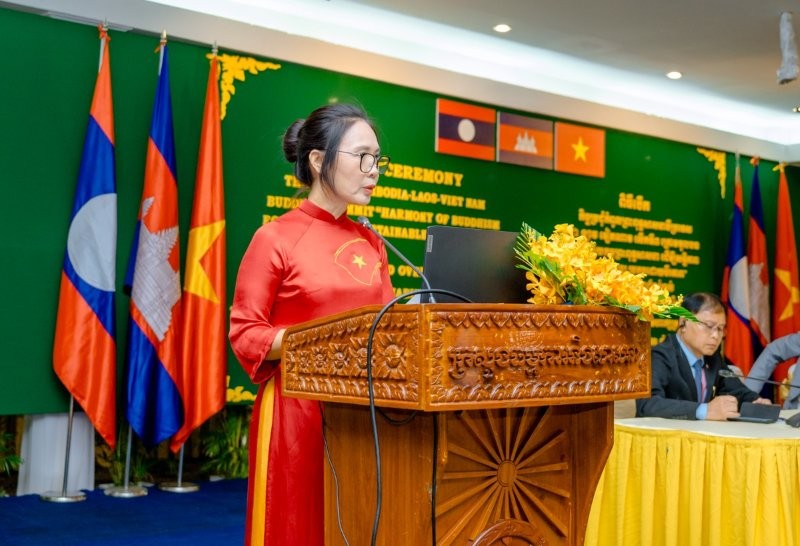
Vice Chairwoman Trần Thị Minh Nga speaks at the event
On the afternoon, the Summit took place with the following contents: Meeting of the Working Group to finalize the Draft Joint Statement; Presentations by Buddhist leaders from the three countries; Summary report and approval of the Joint Statement; Signing ceremony of the Joint Statement, and the Closing ceremony of the Conference.
Representing the Vietnam Buddhist Sangha, Most Venerable Thích Huệ Thông, Vice President of the Central Executive Council cum Head of the Legal Department of the Central Vietnam Buddhist Sangha gave a presentation on the topic "Buddhist harmony for peace and sustainable development".
In the speech, the Most Venerable proposed four key directions of cooperation, including:
- Educational and academic cooperation: Establishing scholarship programs, exchanging lecturers and students between Buddhist institutes, organizing the “Mekong Young Buddhist Knowledge Forum”, building a common curriculum on “Buddhist ethics and sustainable development”.
- Social and environmental cooperation: establishing the “Mekong Buddhist Environmental Action Fund” to finance projects on reforestation, river cleaning, waste management; organizing volunteer activities and environmental protection in border areas.
- Cultural cooperation and propagation: coordinate rotational organization of Mekong Buddhist cultural festivals, digitize scriptures and heritage, and build a common media network to spread the message of peace and happiness.
- Buddhist diplomacy and policy: establishing a regular consultation mechanism between the three Buddhist sanghas, agreeing on a joint statement after each conference, and coordinating at international forums such as the United Nations Vesak Celebrations.
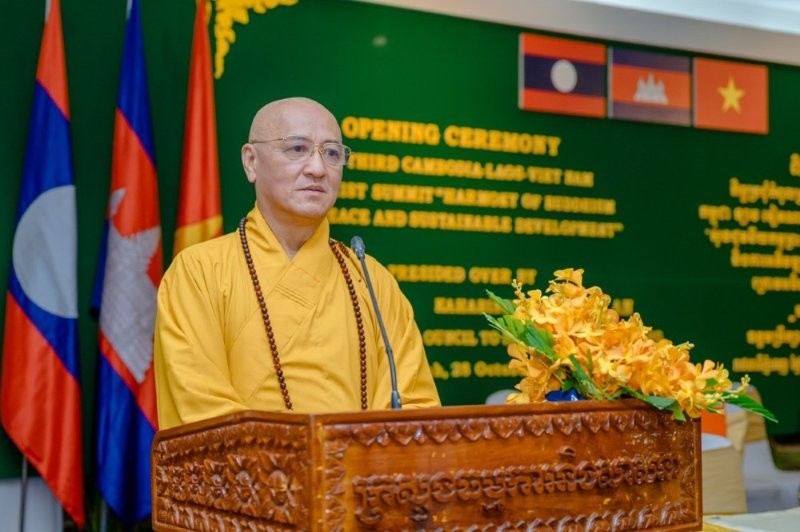
Most Venerable Thích Huệ Thông speaks at the event
At the closing session of the Conference, representatives of Buddhist leaders from the three countries agreed and approved the Joint Statement - an important document demonstrating the spirit of solidarity, cooperation, and developmental orientation of Buddhism in Vietnam, Laos, and Cambodia.
The Joint Statement sets out seven principles and actions, focusing on specific actions such as: Preserving and promoting Buddhist cultural and spiritual heritage; Strengthening regional cooperation between Buddhism in the three countries in the fields of education, research, social welfare, and environmental protection; Promoting peace, harmony, and inter-religious dialogue in the region; Applying Buddhist principles in sustainable development, raising public awareness of climate change and environmental protection; Empowering and educating youth in the Buddhist spirit; Increasing global Buddhist solidarity and cooperation towards the United Nations Sustainable Development Goals (SDGs).
The conference also agreed to assign the Central Buddhist Association of Laos to host the 4th Vietnam-Laos-Cambodia Buddhist Summit in 2027 in Vientiane (Laos).
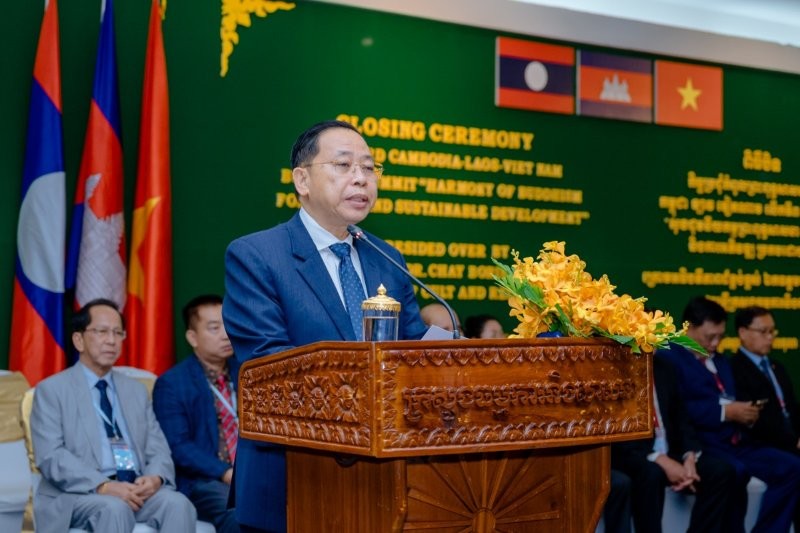
Minister of Cults and Religion of the Kingdom of Cambodia, Chay Borin, delivered the closing speech of the summit
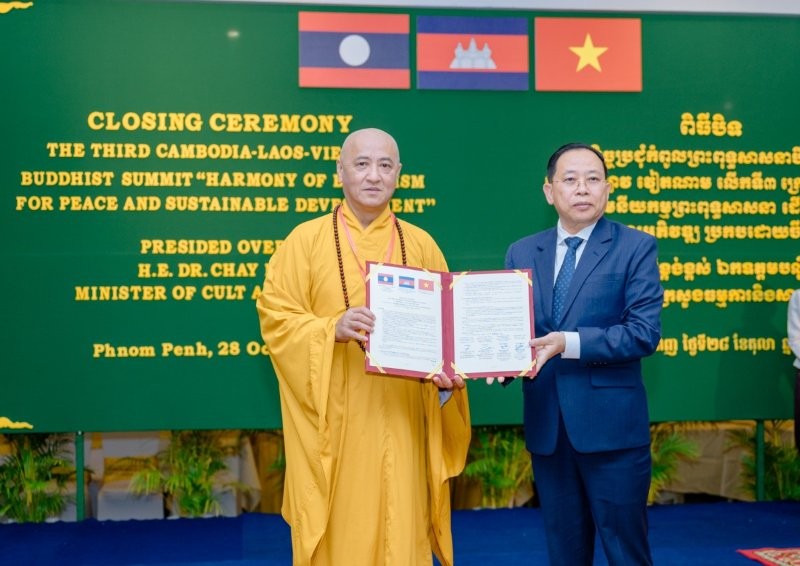
Most Venerable Thích Huệ Thông representing the Vietnamese Buddhist Sangha received the minutes of the signing of the joint statement

.jpg)
Deputy Minister of Ethnic and Religious Affairs Nguyễn Hải Trung and the Vietnamese delegation attending the 3rd Vietnam-Laos -Cambodia Buddhist Summit present a souvenir to the Organizing Committee
Linh Nguyen




